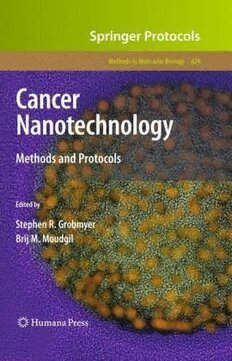
Cancer Nanotechnology: Methods and Protocols PDF
396 Pages·2010·10.693 MB·English
Most books are stored in the elastic cloud where traffic is expensive. For this reason, we have a limit on daily download.
Preview Cancer Nanotechnology: Methods and Protocols
Description:
Early detection of cancer at the cellular level, even before anatomic anomalies are visible, is critical to more efficacious and cost effective diagnosis and therapeutic advances. In Cancer Nanotechnology: Methods and Protocols, an international panel of experts provide the most recent, cutting-edge, "how-to" approaches developed and employed by researchers in a variety of disciplines to identify cancer specific biomarkers, construct suitable multifunctional targeted nanostructure platforms, along with enhanced imaging and therapeutic applications. Covering such topics as multifunctional and multimodal nanoparticles, nanoparticle mediated cancer theranostics, molecular targets for cancer nanotechnology, and nanoparticles for non-invasive image-guided cancer therapy, the volume addresses the key challenges of the field today, specifically targeted and localized delivery of the drugs. As a volume in the highly successful Methods in Molecular Biology™ series, the protocols chapters include brief introductions to their respective topics, lists of the necessary materials and reagents, step-by-step, readily reproducible laboratory protocols, and notes on troubleshooting and avoiding known pitfalls.Authoritative and cutting-edge, Cancer Nanotechnology: Methods and Protocols integrates cancer biology, clinical oncology, molecular cancer imaging, materials science and chemical engineering, biomedical engineering, toxicology, computer science, electrical engineering, chemistry, physics, and mathematics in order to achieve the vital goals of nanotechnology-mediated early cancer detection and more efficacious and less toxic therapies for these devastating diseases.
See more
The list of books you might like
Most books are stored in the elastic cloud where traffic is expensive. For this reason, we have a limit on daily download.
